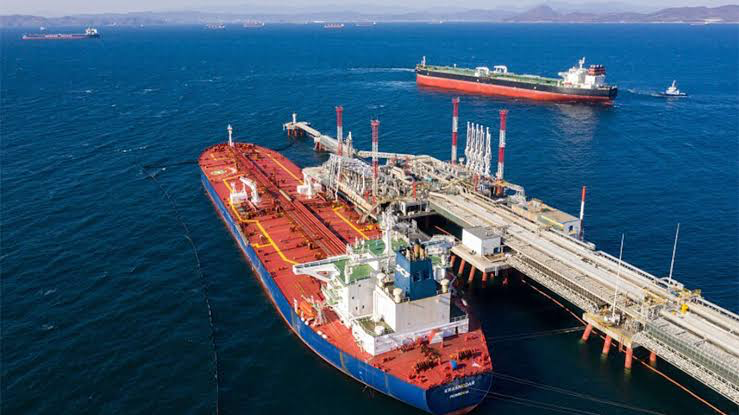Since the European Union imposed sanctions on Russia’s energy exports in 2022, following its invasion of Ukraine, Moscow has been looking for new markets to sell its oil. And it seems to have found them in Asia and Africa, where demand for cheap and reliable energy sources is growing rapidly.
According to ship-tracking data from Kpler, Russia’s seaborne shipments of crude oil and condensate reached new highs of 2.75 billion barrels in 2023, up 4.4% from 2022. This was despite a drop of nearly 46% in shipments to Europe, which used to account for more than 60% of Russia’s oil exports.
To make up for the lost European volumes, Russian exporters slashed oil prices since 2022 to attract customers in far-flung markets and diverted record volumes of crude previously transported by pipeline onto tanker vessels.
The main Russian crude oil grade, Urals, has traded at a discount of more than $20 a barrel to Dated Brent crude – Europe’s main cash oil benchmark – since mid-2022, versus an average discount of less than $2 a barrel in 2021, LSEG data shows.
This aggressive discounting resulted in steep jumps in Russian oil purchases by Asia and Africa and record-high overall crude imports by both continents in 2023.
Asia, which is now the top overall market for Russian oil, increased its imports by 56%, while Africa boosted its imports by 144%. For both regions, the annual increase in oil purchases from Russia in 2023 was the largest ever.
The higher shipments to Asia and Africa also increased the share of Russia’s non-European exports to a record 73% from less than 40% in 2019, ensuring that Moscow has started 2024 far less dependent on Western oil markets than ever before.
Some of the biggest buyers of Russian oil in 2023 were China and India, which together accounted for 48% of all Russian oil flows, compared to about 30% in 2022 and less than 15% in 2021.
However several African nations also posted more than 100% annual growth in Russian oil imports in 2023, such as Ghana, Libya, Tunisia, and Togo. Even Nigeria, an oil producer and exporter, showed a steep jump in Russian oil imports last year.
Some of the import volumes shattered previous records, with flows into Ghana alone topping 16 million barrels in 2023, against 600,000 barrels a year on average from 2017 through 2022, according to Kpler.
With Egypt, Libya, Morocco, Nigeria, Senegal, and Tunisia bringing in an additional 109 million barrels last year, it is clear that Africa as a whole has quickly emerged as a key market for Russian oil sellers.
This trend is likely to continue in the coming years, as both Asia and Africa are expected to remain the main drivers of global energy demand growth, despite efforts to reduce reliance on fossil fuels.
Between 2010 and 2022, Africa’s oil consumption expanded by 21%, according to the Energy Institute Statistical Review of World Energy. That growth lags behind the 28% expansion recorded by Asia-Pacific over the same period but is expected to accelerate over the coming decades as the continent’s massive population and growing businesses dial up consumption of all types of energy.
Much of Africa’s additional energy consumption needs may be met by new and planned increases in renewable energy supplies, especially in households and offices linked to electric grids.
But strong growth in the region’s car numbers, along with the rapid expansion of fuel station networks, looks set to bring steady increases in overall oil and fuel demand and so ensure a reliable and rising market for oil exporters such as Russia.
While Russia’s pivot to Asia and Africa may pose a challenge to other oil producers, such as OPEC members, it may also offer an opportunity for cooperation and dialogue on energy security and sustainability in the face of global climate change.
Source: Reuters



